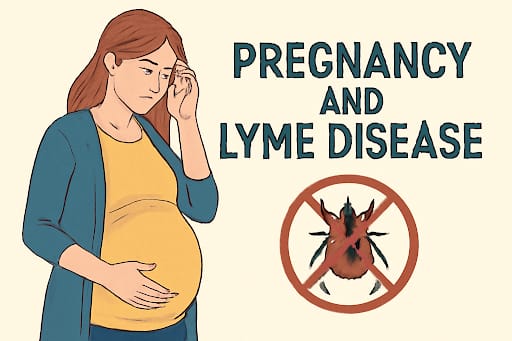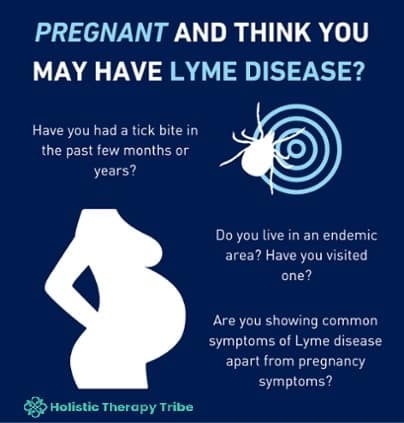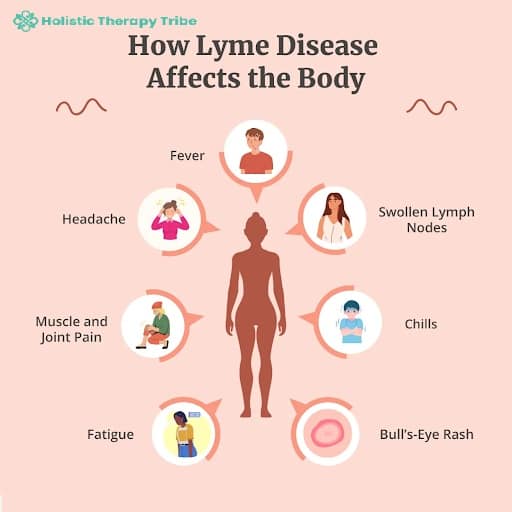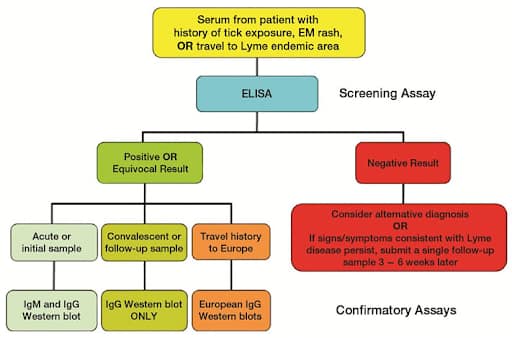
Pregnancy is a very special time and comes with excitement, but it also shares concerns especially when it talks about health. If you are pregnant and have been exposed to Lyme disease, you might be thinking what risks this poses for you and your baby.
Lyme disease during pregnancy can bring rare challenges, but with right treatment and care, many of these problems can be managed effectively.
How does Lyme disease affect pregnancy?

Lyme disease during pregnancy can lead to complications such as preterm labour, fetal growth restriction, or a potential miscarriage. Early treatment reduces these risks.
- Lyme disease can bring risks to a pregnant woman’s health as well as to her unborn baby’s. Sometimes untreated.
- Lyme disease enhances the possibility of preterm delivery, low birth weight, and fetal growth retardation. However, Lyme disease will not normally spread directly to the fetus.
- On the other hand, it might get into the placenta and cause issues during delivery, such as premature delivery.
- Antibiotics are relatively safe to use in pregnant women and can decrease these risks substantially.
- Early detection and management of Lyme disease most significantly reduce the risk of pregnancy complications from Lyme.
Can Lyme disease harm the baby during pregnancy?

Lyme disease during pregnancy generally doesn’t affect the baby directly; complications like preterm birth and low birth weight can occur.
Lyme disease during pregnancy is not usually passed on to the baby because the bacteria that cause Lyme disease do not cross the placenta. However, the baby is still at significant risk if the disease is left untreated.
Preterm birth, low birth weight, or intrauterine growth restriction may be some of the complications. The risks can be minimized with the use of antibiotics if the treatment is done on time.
Pregnant women need to track their symptoms and seek medical attention immediately if they develop symptoms of Lyme disease. Another preventive measure against Lyme disease is the avoidance of ticks during pregnancy.
What are the symptoms of Lyme disease in pregnancy?

Symptoms of Lyme disease during pregnancy include a circular rash, fever, malaise, and arthralgia. These are the main symptoms of Lyme disease during pregnancy; however, early symptoms are more or less like flu-like symptoms.
- The symptoms during pregnancy are also almost the same as those among the nonpregnant individuals.
- It usually begins with a circular, red rash that often progresses to be like a “bull’s-eye” at the tick bite area.
Pregnant women should watch for these since if they do not address these symptoms promptly, they become severe complications.
How is Lyme disease diagnosed during pregnancy?

Lyme disease is diagnosed during pregnancy through a physical examination, a history of exposure to ticks, and blood tests to detect antibodies.
The diagnosis of Lyme disease in pregnancy begins with a full physical examination that specifically looks for characteristic signs of the bull’s-eye rash. The obstetrician should also question the patient about any possible tick exposure, especially if she has spent time in areas known for ticks.
Blood tests, including the Enzyme-Linked Immunosorbent Assay (ELISA) and Western blot tests, are conducted to detect antibodies to the Lyme bacteria. Early diagnosis allows for the beginning of antibiotic treatment.
Pregnant women should take precautions against ticks and seek prompt medical attention when they suspect they have Lyme disease to prevent complications.
Can Lyme disease cause miscarriage?
Lyme disease remaining untreated during pregnancy may increase complications risk such as miscarriage, and congenital anomalies. So, with immediate detection and antibiotic medication treatment, the risk to the fetus and the mother can be reduced.
It is important for pregnant ladies to take preventive strategies against tick bites, through using tick repellents (approved only for pregnancy), protective clothing, and regular observation check for ticks after coming back from outdoors. If in any case a tick bite happens or Lyme disease is suspected, seeking prompt medical help is important to start treatment and reduce potential risk of disease.
How can pregnant women prevent Lyme disease?
Pregnant ladies can take many proactive steps to prevent risk of Lyme disease, a tick borne illness that can pose complications during pregnancy. Some steps are:
- Use of tick repellant approved for application during pregnancy.
- When being outside into wooded or grassy areas, wear protective and appropriate clothing to reduce risk of tick bites.
- After spending time outdoors, a comprehensive thorough check up is important, specially for the hidden areas like scalp and armpits because they are dark and moist areas.
- Take a shower after an outdoor visit.
- If possible, avoid tick prone areas during peak seasons.
Conclusion
- Going through pregnancy comes with its own points of challenges, and the added risk of Lyme disease leads to awareness and proactive care even more crucial.
- Lyme disease can cause complications such as low birth weight and in severe cases – miscarriage. Timely diagnosis and correct treatment with safe pregnancy antibiotics can alleviate these risks.
- Most important part is, Lyme disease is rarely transmitted closely to the fetus if treated accurately
References
- Alliance, Global Lyme. n.d. “Lyme Disease during Pregnancy: Protecting Mothers and Babies.” Accessed September 20, 2023.
- Tracy. 2019. “Lyme Disease and Pregnancy – What You Need to Know | Lyme Disease Advice.” Lyme Disease Advice | Lyme Disease Diagnosis and Natural Treatment Protocols. January 18, 2019.
- “Ticks and Lyme Disease Pregnancy and Lyme Disease.” n.d. PDF.
- dleland. 2021. “New Guidance for Treatment of Lyme and Other TBD in Pregnancy.” LymeDisease.org. October 27, 2021.
- Strobino, Barbara A, Christine L Williams, Syed Abid, Richard Ghalson, and Paul Spierling. 1993. “Lyme Disease and Pregnancy Outcome: A Prospective S of Two Thousand Prenatal Patients.” American Journal of Obstetrics and Gynecology 169 (2): 367–74. ajog.org/article/0002-9378(93)90088 . APA. 2015. “Lyme Disease and Pregnancy.”February 16, 2015.


